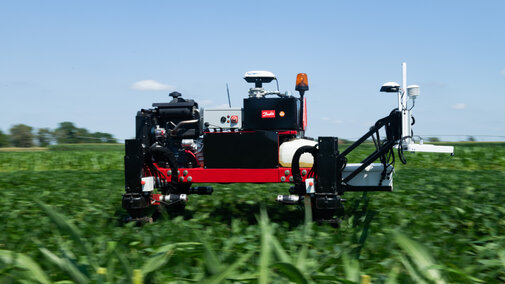The department of Biological Systems Engineering is excited to announce a new major, Agricultural Systems Technology (AGST) that will be available to students starting fall of 2023. This major will be offered through the UNL College of Agricultural Sciences and Natural Resources.
The announcement comes with new scholarship funding in honor of Dr. Jack Schinstock, a long-time UNL faculty member who passed way in 2018. Each scholarship is $2,000, and students can apply online.
By integrating agricultural technology, business and agricultural sciences, the program will prepare students to dive into a variety of careers in agriculture and make a lasting impact.
AGST builds upon a solid foundation laid by previous BSE majors. The department started a Mechanized Agriculture program in the 1950s, then expanded to Mechanized Systems Management in the 1990s. This major is the next evolution responding to industry needs, said David Jones, BSE Department Head.
“The history that is informing Agricultural Systems Technology includes the previous iterations,” he said. “Changes over the last five decades is an example of us continuing to evolve.”
The major will help students gain a practical understanding of agricultural technology and prepare them for the future, said Deepak Keshwani, BSE Associate Professor and Director of Undergraduate Programs. This is informed not only by research conducted in the department, but also strong industry ties.
“Agricultural Systems Technology captures that breadth of technology we see in agriculture today, but we also have to recognize that technology changes,” he said. “This program will provide core skills to help students make sense of technologies to come.”
Through the program, students can expect hands-on experience, research opportunities and plenty of time in the field. Internship work can also provide up to five credit hours. This experiential learning will help bolster understanding, Keshwani said.
“You’re not always going to be in the lecture hall,” he said. “It’s common for students to spend hours in the field collecting data to make sense of what they’re learning in the classroom.”
AGST also offers a more personalized approach by allowing students to design the major to align with their own interests and choose their own minor within the program.
All facets of the degree are designed to help students succeed whether they join the agricultural industry, continue their education, or run their own ag startup. It will help unite all the areas agricultural systems encompass, Jones said, by being complementary to agricultural engineering.
“One of the things this major is going to do is strengthen the partnership across science and technology,” he said. “Agronomists, engineers, scientists — these Agricultural Systems Technology students will be the glue bringing them together.”
For more information about the program and scholarship, visit the Biological Systems Engineering site.

